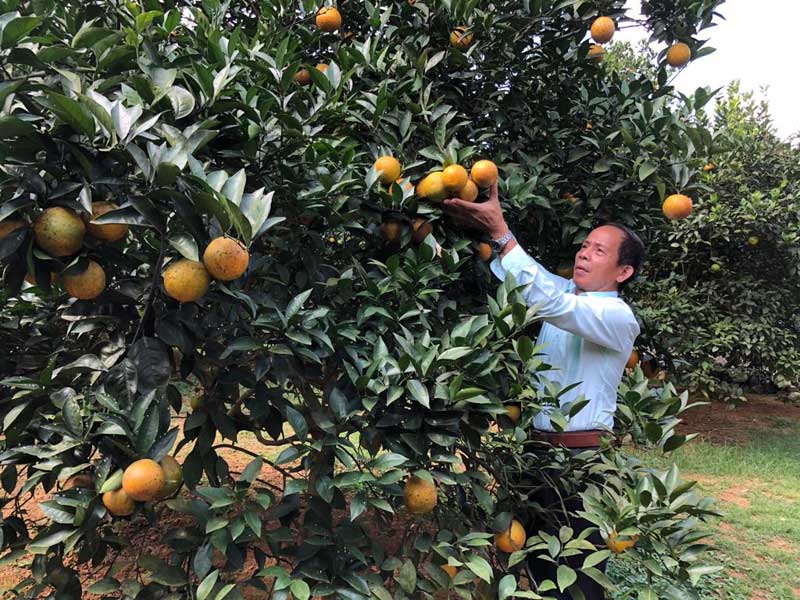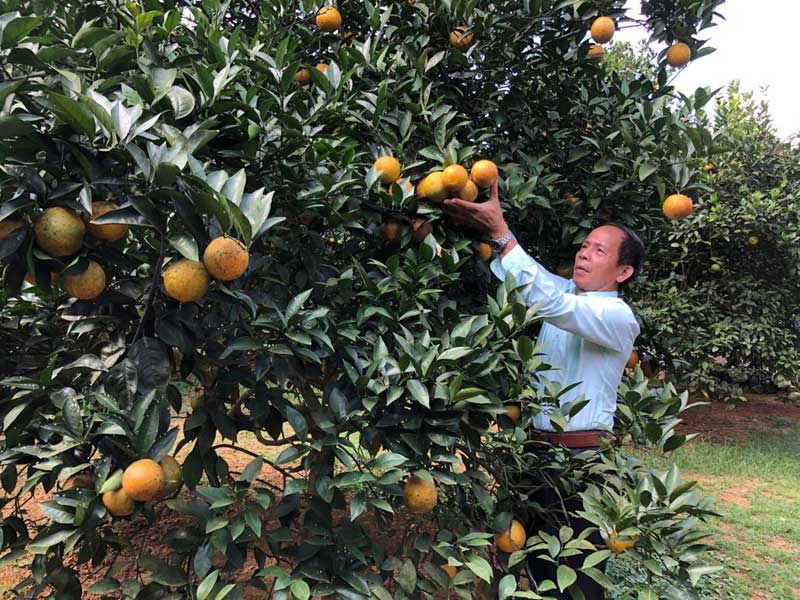
(HBO) - Binh Thanh Commune - new orange fruit growing of Cao Phong District, has been growing citrus fruit trees for about 10 years. Mr. Bui Tien Ban, living in Mo Village 2 is considered to be the first person to plant orange trees in this area.
Orange fruit trees started growing in Binh Thanh in 2008. Up till now, the
area of citrus fruit trees, mainly orange trees, has reached nearly 40
hectares, of which there are about 25 hectares in the exploitation period, 10
hectares in the growing and developing period. Among the orange growers in Binh
Thanh commune, besides Mr. Bui Tien Ban, Mr. Duong Nhu Mung is another typical
grower. He has orange and pomelo trees planted in the area of 11 hectares.
There are about 30 citrus fruit growers, which can be established Nhat Minh
cooperative commune producing and consuming oranges with 16 households.

Orange orchard of Bui Tien Ban, Mo Village 2, Binh Thanh commune,(Cao Phong) with billions of dollars in revenue a year.
Nowadays, no one doubts the suitability and adaptability of these citrus
fruit trees in this new land. According to the local orange and tangerine
growers, the natural condition is quite favorable with less rime. Especially,
the results of the soil and water samples analyzed and tested have ensured that
the condition is really good for irrigation and growing. This is the most
important facts for the households to continue expanding the orange growing
area with a high quantity. This crop, the gardeners calculate that the quantity
of orange and tangerine fruit trees can reach up to 50 - 60 tons / ha.
Thanks to the development of the safe orange growing area applying of
VietGAP production process, oranges and tangerines are trusted and highly
appreciated by customers in the markets in and outside the province. The
selling price at the gardens is kept at 22,000 VND/ kg with the view of consumption
in the systems of Clean Food stores.
With the stable price, the high quality of VietGAP oranges in Binh Thanh
commune has remained constant. More and more growers are investing in growing
fruit trees complying with the safety standards. Among them, Bui Tien Ban’s
orange garden in Mo Village 2 has been appointed as one of the most beautiful
orange orchards at Orange Festivals in Cao Phong district.
According to data from the Hoa Binh Provincial Party Committee, the industrial production index for the first six months of 2025 is estimated to have increased by 20% compared to the same period last year. This marks the highest year-on-year growth rate for this period since 2020.
In the first six months of 2025, Hoa Binh province’s export turnover was estimated at 1.145 billion USD, marking an 18.11% increase compared to the same period in 2024. Import turnover was estimated at $ 804 million, a 17.15% increase, which helped the province maintain a positive trade balance.
The lives of the ethnic minority farmers in Tan Lac district have gradually improved thanks to the new directions in agricultural production. This is a testament to the collective strength fostered through the professional associations and groups implemented by various levels of the district’s Farmers’ Union.
With the motto the "product quality comes first,” after nearly one year of establishment and operation, Muong village’s Clean Food Agricultural and Commercial Cooperative, located in Cau Hamlet, Hung Son Commune (Kim Boi district), has launched reputable, high-quality agricultural products to the market that are well-received by consumers. The products such as Muong village’s pork sausage, salt-cured chicken, and salt-cured pork hocks have gradually carved out a place in the market and they are on the path to obtaining the OCOP certification.
In the past, the phrase "bumper harvest, rock-bottom prices" was a familiar refrain for Vietnamese farmers engaged in fragmented, small-scale agriculture. But today, a new spirit is emerging across rural areas of Hoa Binh province - one of collaboration, organisation, and collective economic models that provide a stable foundation for production.
Maintaining growing area codes and packing facility codes in accordance with regulations is a mandatory requirement for agricultural products to be eligible for export. Recently, the Department of Agriculture and Environment of Hoa Binh province has intensified technical supervision of designated farming areas and packing facilities to safeguard the "green passport" that enables its products to access international markets.



